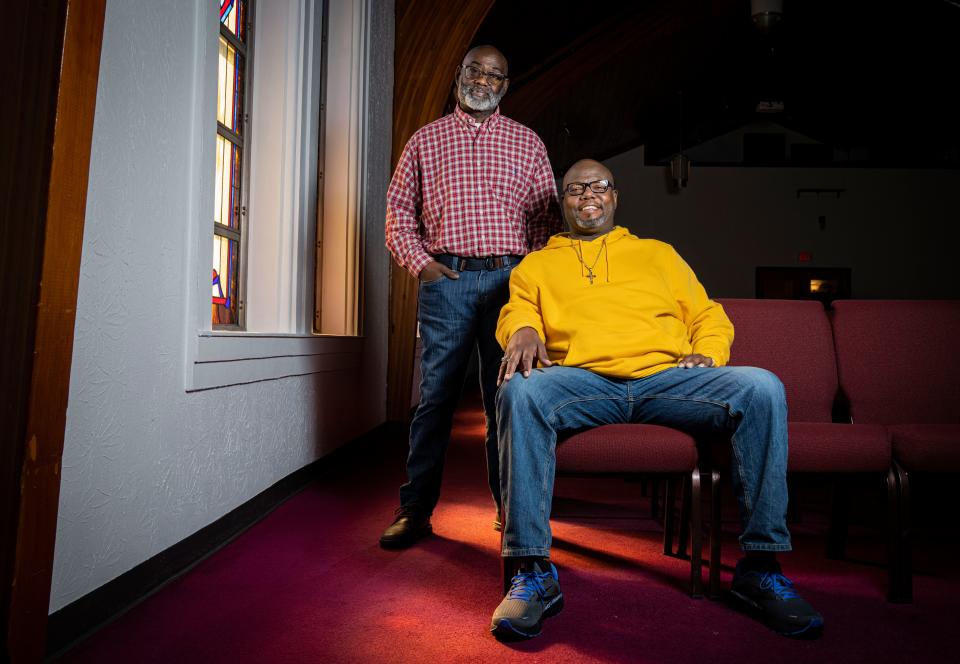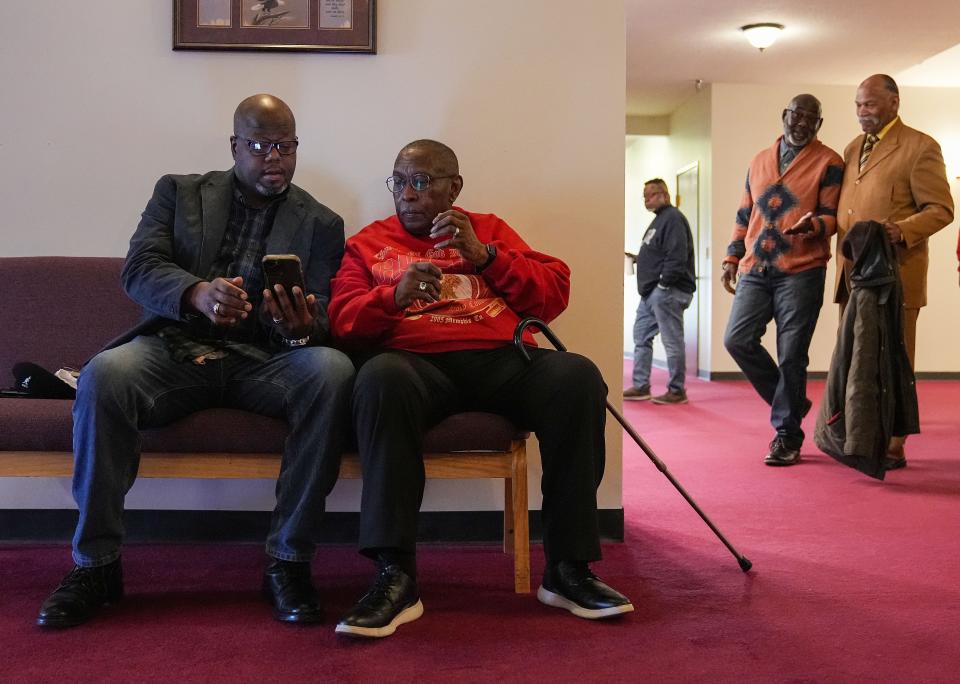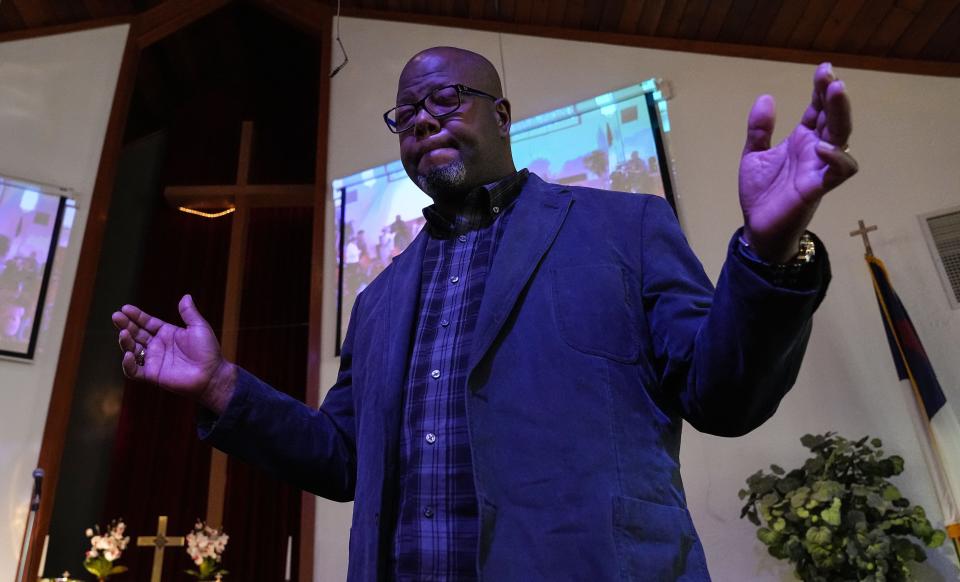He gave his brother his kidney. Then he needed a new kidney himself.
James King and Harambee Purnell have more than a mother in common. They belong to the same fraternity, serve as ministers in the same church and both have undergone kidney transplants. In fact, King’s new kidney initially belonged to Purnell.
But Purnell’s kidney stopped working for King years ago and now King is on the list to receive a second kidney.
Purnell, who is undergoing treatment for cancer that claimed his lone remaining kidney, also became the beneficiary of a transplant of his own.

While complications such as these are extraordinarily rare in the world of organ donation, the two brothers are sharing their story in the hope of raising awareness of the need for organs.
“There is great need out there…. That need’s not going anywhere and it's not going to dramatically alter your life in a negative way,” King said. “In fact, you may get some personal fulfillment out of it.”
More than two decades ago King, now 56, was out to dinner with a friend. As he was leaving the restaurant, his vision suddenly blurred. He went immediately to the hospital, where he learned he had end stage renal failure due to complications from hypertension. To stay alive, he had to go on dialysis.
King told his family he had his condition under control but his mother, who had developed advanced cancer, was concerned. Purnell who lived in Arizona with her knew only one thing would ease her mind: If he moved to Indiana to look after his brother.
While King never asked Purnell for his kidney, when he told his younger brother that would be the only way to get off dialysis, Purnell, now 50, knew what he had to do.

“Once I saw what he was going through, there was no way that I was going to let him continue,” he said. “He told me, you know, I need a kidney. And I said, Well, I'll tell you what, you have it. I'll give you mine.”
Donating a kidney entails a complicated process. After a series of tests, doctors confirmed that Purnell’s kidney would be a good match for King.
On September 14, 2004, doctors removed a kidney from Purnell’s abdomen and placed it in his brother. For King, the transplant proved life-altering.
“I like to call it a get out of jail free card,” King said. “It changes everything. How you eat, how you live, what you can and cannot do. It’s a drastic change.”
After the transplant Purnell developed hypertension, a condition for which doctors recommended he visit a nephrologist twice annually.
The brothers resumed their lives. A few years after the transplant, King’s new kidney — the one Purnell had given him — failed.
“Oh, that was devastating,” King said. “That was the get back in jail card.”
While transplanted kidneys often fail, average longevity for donated kidneys ranges between 15 to 18 years for living donors and 14 to 16 years for deceased, said Dr. Asif Sharfuddin, medical director of kidney and pancreas transplant at IU Health.
As his brother returned to dialysis, Purnell married and had children. But then eight years ago came an even bigger blow.
During a routine visit to the nephrologist, Purnell learned he had cancer in his one remaining kidney, cancer that had spread to his bladder.
“It was probably some of the worst news that I could have possibly received at that time,” Purnell said.
In March 2015, Purnell started treatment but doctors could not save his kidney. A few months later, he had surgery to remove his kidney, bladder and prostate. With no second kidney he, too, had to go on dialysis.
The chance that a donor’s sole kidney will fail further down the line is less than 1%, maybe three or four out of 1,000, said Sharfuddin, Purnell’s doctor.
“This case is highly unusual,” Sharfuddin said. “He did something great to help his brother out and he himself had really bad luck. No one would expect that… This is like an extreme situation.”
The one bright spot: Because of Purnell’s past as a kidney donor, should he ever become medically eligible for a new kidney, he would catapult to the top of the organ donation list. First, Purnell had to complete treatment and live two years cancer free.
In June of 2019, he became eligible for a new kidney.
Even with his priority status, Purnell waited months. On March 6, 2020, he went to IU Health University Hospital, blissfully unmasked. When he woke up from the operation, he found himself in a new world and a hospital full of stressed and fearful caregivers.

Receiving a kidney, he learned, is easier than donating one, especially given that in the intervening years he had undergone numerous painful medical procedures.
“I just had a little pain of where they put the kidney in,” he said. “I was up and walking the very next day.”
After eight days, he went home, where he stayed sequestered through the pandemic’s early months.
By this point, King decided after years of pondering that he would go on the list for a second kidney. Although at first he had not wanted to go through with another transplant and stay on dialysis, he had explored the process more and is now comfortable with the idea.
“I wasn't sure about the parameters of a second kidney. I didn't know how that would work,” he said
About 15 to 20% of patients on the transplant list are awaiting a second or third transplant, Sharfuddin said. Unlike Purnell, however, King does not receive priority.
Meanwhile, Purnell had upsetting news about his own prognosis. Last year, almost two years after he had the kidney transplant, his doctors found spots on his lungs and the nodes in his neck. The cancer was back and had spread.
While there’s no way to know for sure, the doctors suspected that some of the immunosuppressive drugs that Purnell had taken to prevent his body from rejecting his new kidney may have contributed to the return of the cancer.
“Theoretically it’s possible that the medicines he was on, they may have had a role in reoccurrence of the cancer,” Sharfuddin said.
Knowing that certain chemotherapies may increase the risk of organ rejection, Purnell’s doctors made calculated decisions about his chemotherapy regimen, stopping some of the immunosuppressive drugs he takes that might be helping the cancer spread.
So far, both doctor and patient say, the combination appears to be working.
Today the two brothers live a short way from one another, King in Speedway and Purnell in Pike Township. Like brothers, they bicker happily about inconsequential matters, such as how long a drive separates their two homes — Purnell ribbing King because “he's older so he drives slow.” They both serve as associate ministers at Emmanuel Christian Fellowship Center on the eastside.
With all the health issues the two men have faced, they take care of one another, said Purnell, adding that he has been learning from his older brother since he was a child.
Now that King needs another kidney, the two decided to share their story in the hope of raising awareness of organ donation. Even in hindsight Purnell has no regrets that years ago he gave his brother one of his kidneys and wound up losing the other.
“If there was a way that you can take the donated kidney that I have in my stomach and split it in half, I will give it to him right now,” he said.
Contact IndyStar reporter Shari Rudavsky at shari.rudavsky@indystar.com. Follow her on Twitter @srudavsky.
This article originally appeared on Indianapolis Star: Brother donates kidney then needs kidney transplant himself

